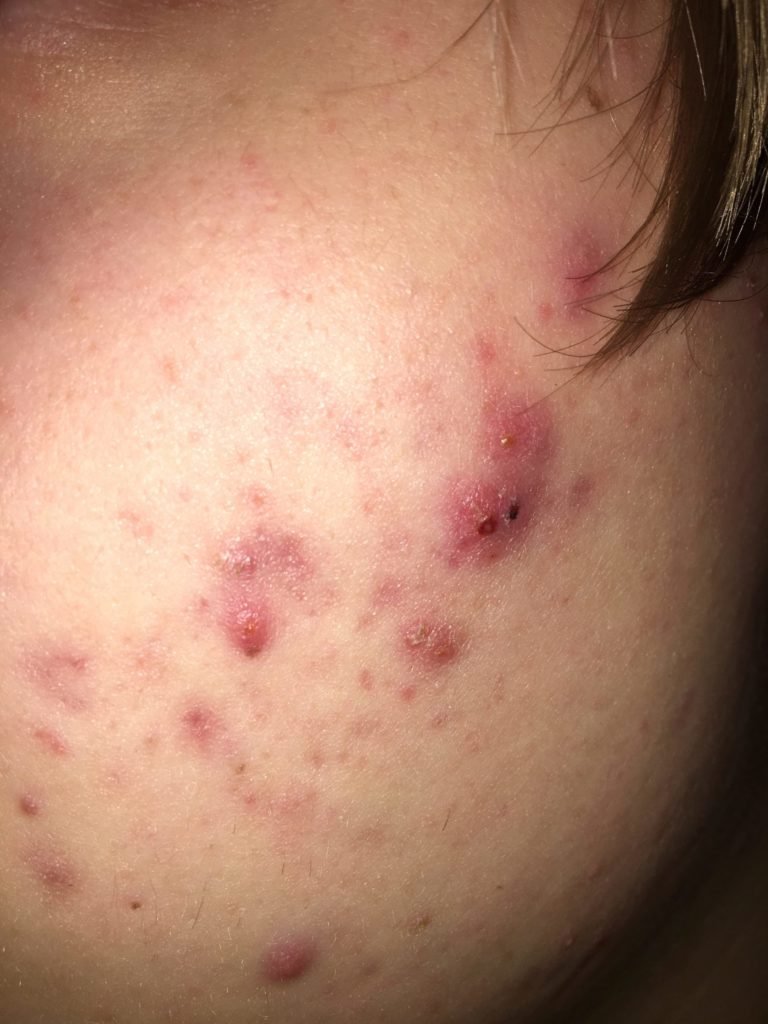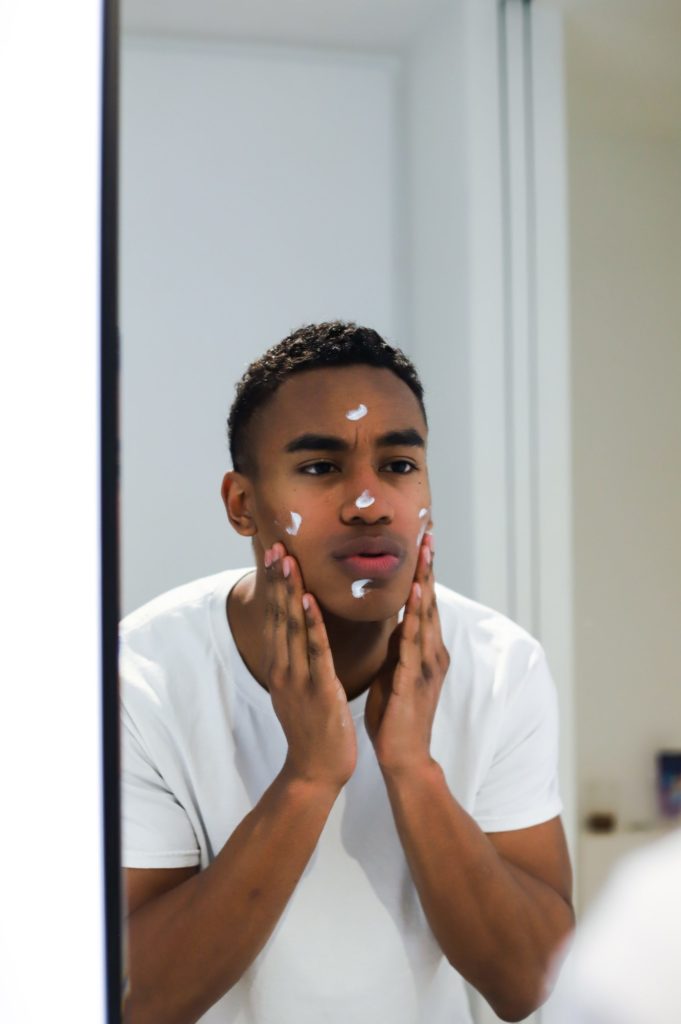Acne
Acne is one of the most common conditions we treat in dermatology. It’s also one of the most misunderstood. Did you know that face washing and hygiene play a relatively minor role in acne formation? Instead, it’s the result of our hormones interacting with our oil glands and pores.
The most common time that this interaction occurs is when we’re younger (adolescence to teen years), when our hormones are elevated due to puberty. Another time this can occur is when females experience flares as a result of hormonal fluctuations throughout the month.
Complicating matters further, genetics affects this hormonal interaction as well. If we inherit oil glands which are particularly sensitive, they can undergo changes even when we have ‘normal’ hormone levels!
So what exactly are the changes which result from this interaction between our hormones and oil glands?
The first hormonally-driven change occurs when the skin cells within our pores ‘stick’ to each other and clog the pore. This is seen in what many will refer to as a ‘blackhead’. So-called open comedones (‘blackheads’) are nothing more than a combination of skin cells and oil which, when exposed to the air, have turned dark. This is important – the dark surface of ‘blackheads’ is not caused by dirt! This is a misconception.
There are other types of comedones called closed comedones. Closed comedones are also the result of skin cells clumping together, but they are formed deeper within the pore. As a result, their surface isn’t exposed to the air, so they don’t form the characteristic dark color seen in ‘blackheads’.
So what causes inflamed acne pimples?
The inflammation seen within the average acne pimple is caused by a bacteria called P. acnes. It’s a bacteria which is actually present in everyone’s skin and is unique in that it prefers a ‘low-oxygen’ environment. When the previously-mentioned comedones are formed deep within the pore, they can limit the ability of oxygen to reach the oil glands – the very place where this bacteria lives. With little oxygen present, the bacteria thrives, essentially causing an infection of the oil glands that we recognize as the typical red acne pimple.

So-called open comedones (‘blackheads’) are nothing more than a combination of skin cells and oil which, when exposed to the air, have turned dark. This is important – the dark surface of ‘blackheads’ is not caused by dirt! This is a misconception.
Treatment of Acne in Southampton, PA
Now that you know how acne is formed, it should be no wonder that most treatments focus on either unclogging the pores, killing bacteria, and/or decreasing the ability of hormones to influence the oil glands in the first place.

Unclogging the Pores
The two types of medications which help to unclog the pores are retinoids and keratolytics. Retinoids are medicines like over-the-counter ‘retinol’, and prescriptions like tretinoin, Retin A®, and Differin®. They work by changing the rate that skin cells lining your pores are produced which, in turn, helps prevent them from clumping together. Alternatively, salicylic and glycolic acid are the two most common keratolytics. They work by breaking up the clump of skin cells and oil that create the previously mentioned ‘comedones’.
Killing Bacteria
Both topical and systemic antibiotics can be used to kill the P. acnes bacteria. Benzoyl peroxide is the most well-known of the acne-fighting antibiotics and is applied topically. It’s found in a number of over-the-counter products, though it’s also incorporated into many prescription medications. Most patients visiting a dermatologist have found that benzoyl peroxide alone provides only limited relief. At this point, it’s time to consider prescription antibiotics – in either topical (lotions, creams, etc.) or systemic form (pills, capsules, etc.).
‘Blocking’ Hormones
Decreasing the ability of hormones to create acne-causing changes in the first place can be an effective treatment. For a variety of reasons, though, this treatment approach is one which is only available to female patients. Examples include oral contraceptives as well as a medication called spironolactone.
Shutting down the oil gland
Systemic treatment with isotretinoin (Accutane, Myorisan, Absorica/Absorica LD, Claravis, Zenatane, Amnesteem) is indicated for acne that is resistant to treatment, produces scarring, or produces significant physical or emotional distress. This medicine is extremely effective and may offer some patients a chance at a permanent acne reduction, however, it requires appopriate monitoring by a professional.
Contact Us Today for Acne Scar Treatment
When you need a dermatologist for vitiligo in Southampton PA or acne scar treatment, we’re the ones to call. Trust in our expert care to find relief.
The Best Acne Scar Treatments and Other Acne Treatments in Southampton PA
Whether you’re suffering from acne now or you have in the past, there’s a chance that you may have acne scars as well. Your facial skin may have deep grooves where the acne used to be located. If you’re embarrassed by your facial skin, then you can find relief at Penn Dermatology Specialists. We have acne scar treatment and acne treatments for those in need of relief. Here’s what you need to know about our acne scar treatments and acne services in Southampton PA.
Rely on Our Dermatologist and Dermatology Providers for Acne Scar Treatment
We can treat acne scarring and acne. Some of the most common acne scar treatments are:
- Chemical peels
- Certain ointments
Our medical dermatology services in Bucks County include minimally invasive procedures. Phototherapy in Southampton PA may be exactly what you need to find relief from redness and swelling as well as deep grooves.
Isotretinoin & iPLEDGE
- Also known as “Accutane”, “Claravis”, “Amnesteem”, “Myorisan”, “Absorica”, “Sotret”, and “Zenatane” – all of these medications are brand names for the drug isotretinoin.
- Isotretinoin is the strongest anti-acne agent in existence, however, it requires appropriate monitoring and use.
- Knowledge of the iPLEDGE system is necessary to prescribe isotretinoin.
- Pennsylvania Dermatology Specialists are iPLEDGE experts and are familiar with its intricacies and use. If you have severe acne, cystic acne, scarring acne, or acne that is persistent despite adequate therapy, this may be the treatment for you. Call to make an appointment today!

